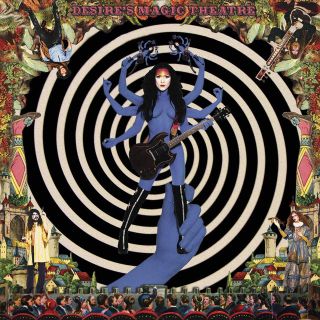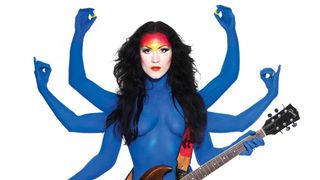“Doing DMT for the first time was kind of a big eye-opener. I’ve done it several times now and had some absolutely mental experiences. I’ve always been a chaser of that gateway, ever since I first tried acid, and DMT is just indescribably more. It was very humbling, really. It made me see the infinite and my place in the world, more quickly than any other drug I’ve taken. It was humbling but also exciting.”
The world might not know it yet, but Rosalie Cunningham is a rock star. For a start, she exudes an effortless charisma and quiet confidence that belies her relative youth at 25 years old. She looks every bit as enchantingly otherworldly and elegant in real life as she does in her band Purson’s videos and promotional snaps. She’s also quite happy to regale us with tales of lysergic derring-do and an enthusiasm for the kind of psychedelic experiences that inspired some of the greatest records of all time, 40 years ago. This, it hardly needs emphasising, is proper rock star behaviour. Most of all, though, Rosalie Cunningham is top-notch rock star material because the music she makes is meticulously but lovingly designed to blow minds. One listen to the joyously eccentric and mischievous psychedelic rock tour-de-force that is Desire’s Magic Theatre (the title’s initials are deliberate, of course) and it will become immediately apparent that life is a lot more fun on the other side of the cracked mirror.
I tried making DMT in my kitchen
“You can’t treat DMT like a drug,” she continues. “You need to treat it like an experiment. I even tried making it, but ended up with my kitchen smelling of petrol, ha ha! You can’t really reflect on it while you’re in it, like you can on mushrooms or acid. It’s a barrage of information, and only afterwards can you piece together some of the things that happened so it actually makes sense. In fact, I don’t think the brain is at all involved. It’s a direct line out of the top of your head – a direct line to God or the cosmos or whatever. You can’t think when you’re in it. You’re just a vessel for the experience. You’re not paranoid. You’re just watching this thing pan out in front of you. But it’s not like anything else.”
The same, of course, can and will be said about Purson this year, as their second album unfurls in front of an expectant world like some wild, kaleidoscopic bloom. Although initially associated with the doom metal scene, thanks in part to the early involvement of Lee Dorrian’s Rise Above label, the Londoners are a genuine anomaly in today’s music world, with a proudly organic and predominantly analogue sound that owes much to the pioneering psychedelic works of The Beatles, Pink Floyd and The Doors – with, it has to be said, a subtle but unmistakable debt to Black Sabbath – and an eye-frying, opulently hued image that gleefully harks back to the late 60s. In less able hands, what Purson do could easily be a clumsy, retro pastiche, but Rosalie has absorbed the genre’s essence into her own DNA.
“My childhood wasn’t that out of the ordinary and not everyone grows up into the same headspace, do they?” she grins. “But I do think of music as playful for me, and it’s always been that way. It’s always been very innocent, very free of the heaviness of being an adult. Psychedelia is a celebration of life. This album is just an explosion of happiness from me, because I was very down for a long time and now I’m much happier. I just hadn’t felt happy for a long time, so this album was like, ‘Oh wow, I’m free! I can do what I want!’ I could actually tell the world how great everything is! I’m not doing this out of pain anymore.”
Something that has always been a strong component in the world of psychedelic music, be it the heaviest rock or the quirkiest pop, is a sense of childlike wonder. As with most likeminded artists, Rosalie’s professed fascination with the limitless possibilities in sound, vision and experience stem directly from discovering music as a young child. Raised in a creative and liberal environment by a musician father and yoga teacher mother, Rosalie, her twin younger brothers and her younger sister were surrounded by music from birth, which probably explains how she became the idiosyncratic songwriter she is today.
“Music was just part of our play and our learning to express ourselves as we were growing up,” she says. “Also, there is a competitive edge between my brothers and I. I was always more into piano, and my younger brother started playing guitar and got really good, really fast, and I wasn’t having any of that! So I quickly became competitive with him and got to a certain standard. He was always better than me back then, although I think I’m better than him now!”
She pauses. “My sister’s not interested in music at all. I’m not sure what happened there, ha ha ha!”
Perhaps a little unusually for someone born in the 90s, Rosalie’s first musical love and true obsession was The Beatles, a band she discovered through her father’s record collection. In fact, she attributes everything she knows about music and how it works to years spent poring over the Fab Four’s many great works.
“It must seem like I’m exaggerating with this, because I do say it all the time, but it really was my introduction to everything,” she notes. “It was also my introduction to being obsessed with something, too. In my bedroom I had all the posters and records and that fed into wanting to experience that with other bands and then starting bands of my own.”
Formed while Rosalie was at an all- girls boarding school – “I didn’t have many friends and I was always in trouble!” she smiles – her first band were called Suzie’s Lip.

“I don’t know where that name came from!” she laughs. “I was 13 when we played our first gig and we gigged for about two years. The other girl in the band was the only other girl at school who played guitar, so I rallied her into being really into it. We bonded over The Beatles and I got her into lots of other music, so we were coming from that 60s angle, but more bubblegum pop than psychedelia. It wasn’t very good. Ha ha ha!”
By her mid-teens, Rosalie was hellbent on a career in music. She formed goth-tinged new wave crew Ipso Facto in 2007, releasing three singles and an EP and generating plenty of interest at the hip end of the music media. But such was the strength and focus of her own vision for music that Ipso Facto were doomed, splitting in 2009 and paving the way for the formation of Purson. What happened next is well-documented: the band’s original lineup, featuring Rosalie’s then- boyfriend Ed Turner on bass, disintegrated when both Ed and keyboardist Samuel Robinson’s boyfriend were sectioned under the Mental Health Act. The dark time the singer and her bandmates subsequently went through was cryptically documented on Purson’s debut album, 2013’s The Circle And The Blue Door, the fine line between rock’n’roll indulgence and personal disaster writ large in songs that exuded a palpable sense of unease.
I’ve experienced a direct line to God
“Me and Sam were going through a very, very difficult time when I was trying to record that album and a lot of the lyrics are about that and the struggle between light and dark,” says Rosalie. “It’s about the way that I saw things then. But I see things very differently now.”
Back in 2016, and Purson could hardly be in a better place. Desire’s Magic Theatre is destined to stand out like a fiery phoenix emerging from a swamp. With the rock and metal underground already conquered and cautious designs on greater success in the mainstream, Rosalie’s lifelong quest to reach enlightenment through wickedly melodramatic and mischievous rock’n’ roll seems to be reaching a thrilling zenith. Asked if she relishes the prospect of becoming a very big deal indeed, she furrows her brow and thinks hard for a few seconds. Then her eyes sparkle as if momentarily transported back to that DMT-induced state of enlightenment….
“I love being Rosalie Cunningham, the rock star,” she states. “But that’s not the whole of me. What you see in Purson, that’s the side of me that’s the show-off. It’s an exaggeration but it’s very much the real me. The thing is, it’s not like we get paid for this, so all that matters is our integrity, and if we lose that, we’re nothing. For me, music provides a stepping stone into that sense of joy and wonderment and I hope we can provide that for other people.”
Drug Life
All your need to know about the substance behind Desire’s Magic Theatre
WHAT IS DMT?
DMT is Dimethyltryptamine – a psychedelic compound first found in the root bark of the plant Mimosa tenuiflora in 1946.
WHAT DO WE KNOW ABOUT IT?
It’s consumed by Amazonian tribes via a shamanic potion called ayahuasca as a form of medicine and as a path to enlightenment. Also taken in synthesised form, DMT induces visual and auditory hallucinations, often with meta-physical overtones but difficult to describe after the event.
HOW DID DMT BECOME KNOWN TO WESTERNERS?
Partly thanks to its most famous advocate, US ethnobotanist and author Terence McKenna, who first imbibed the substance during a trip to the Amazon in 1971. He became synonymous with the pro-psychedelics New Age movement of the early 80s. Many users claim to have encountered strange, humanoid beings during their wildest DMT trips. McKenna used the terms ‘machine elves’ and ‘fractal elves’ to describe them.
WHAT ARE THE DANGERS?
In the UK, DMT is a Class A drug, so it’s highly illegal – being caught in possession alone will get you into a heap of trouble. The Talk To Frank website says it can have frightening hallucinatory effects, serious implications for someone with a history of mental health problems, and could be responsible for triggering a problem in people who are predisposed but unaware of it. For more info, see Talk To Frank.
DESIRE’S MAGIC THEATRE IS OUT ON APRIL 29 VIA SPINEFARM. TINA KORHONEN, WHO TOOK THE PICTURES ON THESE PAGES, IS EXHIBITING HER MUSIC PHOTOGRAPHY AT LONDON’S GIBSON SHOWROOM UNTIL MAY 16


